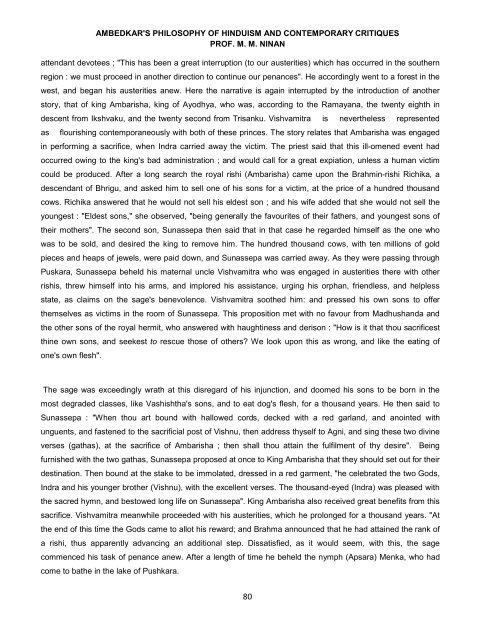Ambedkar-Philosophy of Hinduism
Create successful ePaper yourself
Turn your PDF publications into a flip-book with our unique Google optimized e-Paper software.
AMBEDKAR'S PHILOSOPHY OF HINDUISM AND CONTEMPORARY CRITIQUES<br />
PROF. M. M. NINAN<br />
attendant devotees ; "This has been a great interruption (to our austerities) which has occurred in the southern<br />
region : we must proceed in another direction to continue our penances". He accordingly went to a forest in the<br />
west, and began his austerities anew. Here the narrative is again interrupted by the introduction <strong>of</strong> another<br />
story, that <strong>of</strong> king Ambarisha, king <strong>of</strong> Ayodhya, who was, according to the Ramayana, the twenty eighth in<br />
descent from Ikshvaku, and the twenty second from Trisanku. Vishvamitra is nevertheless represented<br />
as<br />
flourishing contemporaneously with both <strong>of</strong> these princes. The story relates that Ambarisha was engaged<br />
in performing a sacrifice, when Indra carried away the victim. The priest said that this ill-omened event had<br />
occurred owing to the king's bad administration ; and would call for a great expiation, unless a human victim<br />
could be produced. After a long search the royal rishi (Ambarisha) came upon the Brahmin-rishi Richika, a<br />
descendant <strong>of</strong> Bhrigu, and asked him to sell one <strong>of</strong> his sons for a victim, at the price <strong>of</strong> a hundred thousand<br />
cows. Richika answered that he would not sell his eldest son ; and his wife added that she would not sell the<br />
youngest : "Eldest sons," she observed, "being generally the favourites <strong>of</strong> their fathers, and youngest sons <strong>of</strong><br />
their mothers". The second son, Sunassepa then said that in that case he regarded himself as the one who<br />
was to be sold, and desired the king to remove him. The hundred thousand cows, with ten millions <strong>of</strong> gold<br />
pieces and heaps <strong>of</strong> jewels, were paid down, and Sunassepa was carried away. As they were passing through<br />
Puskara, Sunassepa beheld his maternal uncle Vishvamitra who was engaged in austerities there with other<br />
rishis, threw himself into his arms, and implored his assistance, urging his orphan, friendless, and helpless<br />
state, as claims on the sage's benevolence. Vishvarnitra soothed him: and pressed his own sons to <strong>of</strong>fer<br />
themselves as victims in the room <strong>of</strong> Sunassepa. This proposition met with no favour from Madhushanda and<br />
the other sons <strong>of</strong> the royal hermit, who answered with haughtiness and derison : "How is it that thou sacrificest<br />
thine own sons, and seekest to rescue those <strong>of</strong> others? We look upon this as wrong, and like the eating <strong>of</strong><br />
one's own flesh".<br />
The sage was exceedingly wrath at this disregard <strong>of</strong> his injunction, and doomed his sons to be born in the<br />
most degraded classes, like Vashishtha's sons, and to eat dog's flesh, for a thousand years. He then said to<br />
Sunassepa : "When thou art bound with hallowed cords, decked with a red garland, and anointed with<br />
unguents, and fastened to the sacrificial post <strong>of</strong> Vishnu, then address thyself to Agni, and sing these two divine<br />
verses (gathas), at the sacrifice <strong>of</strong> Ambarisha ; then shall thou attain the fulfilment <strong>of</strong> thy desire". Being<br />
furnished with the two gathas, Sunassepa proposed at once to King Ambarisha that they should set out for their<br />
destination. Then bound at the stake to be immolated, dressed in a red garment, "he celebrated the two Gods,<br />
Indra and his younger brother (Vishnu), with the excellent verses. The thousand-eyed (Indra) was pleased with<br />
the sacred hymn, and bestowed long life on Sunassepa". King Ambarisha also received great benefits from this<br />
sacrifice. Vishvamitra meanwhile proceeded with his austerities, which he prolonged for a thousand years. "At<br />
the end <strong>of</strong> this time the Gods came to allot his reward; and Brahma announced that he had attained the rank <strong>of</strong><br />
a rishi, thus apparently advancing an additional step. Dissatisfied, as it would seem, with this, the sage<br />
commenced his task <strong>of</strong> penance anew. After a length <strong>of</strong> time he beheld the nymph (Apsara) Menka, who had<br />
come to bathe in the lake <strong>of</strong> Pushkara.<br />
80


















